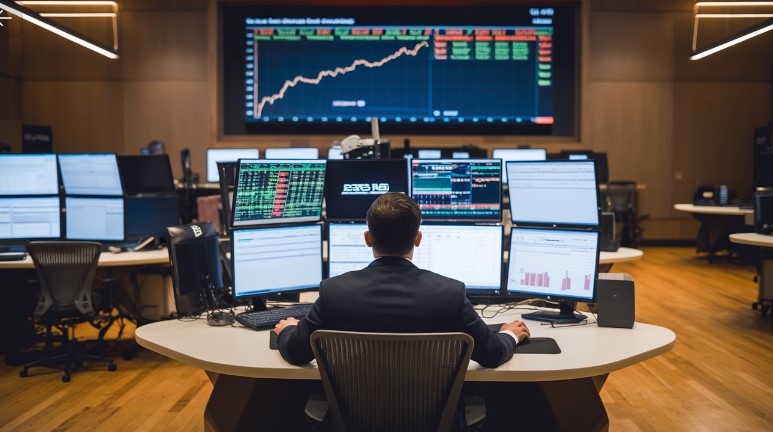Futures Trading for Beginners: Understanding the Market and Exploring Prop Firms

Futures trading has become one of the most dynamic and accessible forms of market speculation and risk management. While it’s often seen as a complex domain reserved for professionals, many retail traders are now turning to futures for their liquidity, leverage, and around-the-clock access.
In this article, we’ll cover everything you need to know to start trading futures, the role of proprietary trading firms (prop firms) in the futures market, and how to build your strategy for success.
What is Futures Trading?
At its core, futures trading involves buying or selling a contract that obligates the trader to purchase or deliver an asset at a predetermined price and date in the future. Unlike trading stocks, you are not buying the asset itself—you’re speculating on its price movement.
Futures contracts exist for a wide variety of underlying assets, including:
- Commodities: oil, gold, wheat, corn
- Indices: S&P 500, Nasdaq, Dow Jones
- Currencies: EUR/USD, JPY/USD
- Interest rates: U.S. Treasury bonds and notes
- Cryptocurrencies: Bitcoin and Ethereum (on select exchanges)
Futures contracts are standardized and traded on exchanges like the Chicago Mercantile Exchange (CME).
Why Trade Futures?
1. High Leverage
Futures trading allows you to control a large position with a relatively small amount of capital. For example, margin requirements for E-mini S&P 500 contracts are often a fraction of the total contract value.
2. Liquidity
Many futures markets, especially index futures like the S&P 500 (ES), are highly liquid, meaning you can enter and exit trades easily without major slippage.
3. 24-Hour Market
Unlike stocks, futures trade nearly 24 hours a day during the business week, allowing traders to act on global events in real-time.
4. Hedging Opportunities
Futures aren’t just for speculators. Businesses and investors use them to hedge risk in currency, commodities, and interest rates.
How Futures Trading Works
The Basics of a Futures Contract
Let’s say you’re trading a crude oil futures contract that represents 1,000 barrels of oil. If the price is $80 per barrel, one contract is worth $80,000. However, you only need a fraction of that (called initial margin) to control the position—maybe $5,000 depending on the broker and contract.
When the price moves, your account reflects unrealized profit or loss in real-time. For example, if oil goes from $80 to $81, you make $1 per barrel x 1,000 = $1,000. If it drops to $79, you lose $1,000.
Common Futures Contracts for Beginners
Here are a few popular contracts for those starting out:
- E-mini S&P 500 (ES): Tracks the S&P 500 index; very popular among day traders.
- Micro E-mini S&P 500 (MES): 1/10th the size of the ES; good Futures trading for beginners.
- Crude Oil (CL): Volatile and offers big opportunities—but also higher risk.
- Gold (GC): Used by investors as a hedge; trades with decent volume.
- Bitcoin Futures (BTC): Offered on some exchanges; extremely volatile.
Risks of Futures Trading
Before jumping in, it’s important to understand the risks involved:
1. Leverage Risk
While leverage can amplify gains, it also magnifies losses. A small move against your position can result in a margin call or a liquidated position.
2. Volatility
Markets like crude oil and crypto can swing wildly within minutes, making them challenging for new traders.
3. Psychological Pressure
High stakes and real-time price movement can affect your decision-making and lead to emotional trading.
What Are Futures Prop Firms?
Proprietary trading firms, or prop firms, allow qualified traders to trade the firm’s capital instead of their own. In return, the firm takes a portion of the profits while providing the trader with capital, tools, and sometimes training.
How Futures Prop Firms Work
- Evaluation Phase
You typically need to pass an evaluation where you show profitable trading while following risk rules (like daily drawdown limits and position sizing). - Funding
Once you pass the evaluation, the firm provides you with a funded account—this can range from $25,000 to $250,000 or more. - Profit Split
Most prop firms offer traders between 70% to 90% of the profits they generate. - Risk Management
Firms set strict risk parameters to protect their capital. If you breach these, your account may be paused or closed.
Advantages of Trading With a Futures Prop Firm
- Access to Large Capital: Instead of risking your own savings, you can trade with a funded account.
- Reduced Psychological Risk: You’re not losing your own money—making it easier to trade rationally.
- Mentorship and Support: Some firms offer training, feedback, and coaching.
- No Long-Term Commitments: You can often start, pause, or stop at any time.
Leading Futures Prop Firm Models
Many futures prop firms now operate online with a virtual evaluation model. Popular ones include:
- Firms offering simulated evaluations where traders demonstrate consistency before gaining funding.
- Firms focused on CME futures products (like E-mini and Micro contracts).
- Subscription-based models where traders pay a monthly fee until they pass the evaluation.
Each firm has different rules, such as:
- Daily loss limits
- Profit targets
- Timeframes to meet goals
- Trade size limits
Choosing the right firm depends on your strategy, discipline, and risk tolerance.
Tips for Beginners Getting Into Futures
1. Start with Micro Contracts
Begin with micro futures (like MES) to get comfortable with contract mechanics and manage risk.
2. Use a Demo Account
Before going live or joining a prop firm, practice on a simulated trading platform to build consistency.
3. Create a Trading Plan
Outline when you will trade, how you will manage risk, and what setups you’ll focus on. Stick to it religiously.
4. Keep a Trading Journal
Track every trade: entry, exit, reason for the trade, emotion level, and outcome. This will help identify patterns and mistakes.
5. Focus on Risk Management
Successful futures traders often think more about losing less than winning more. Keep your risk per trade small—typically 1-2% of your account.
6. Stay Informed
Follow economic calendars and news events. Futures markets respond heavily to interest rate changes, job reports, and geopolitical news.
Is Futures Trading Right for You?
Futures trading isn’t for everyone. It demands discipline, emotional control, and a solid understanding of market behavior. However, for those willing to learn and manage their risk, it offers immense opportunities—including the potential to earn a funded account through a prop firm.
Whether you’re trading independently or aiming to join a futures trading prop firm, education, consistency, and risk management are your most valuable tools.
Final Thoughts
Futures trading is an exciting path for traders looking for leverage, flexibility, and challenge. By understanding how the contracts work, being aware of the risks, and choosing the right entry point—like micro contracts or a prop firm evaluation—you can develop into a confident and competent futures trader.
For beginners, the journey starts with education and practice. Consider combining demo trading, journal analysis, and evaluations with prop firms as a stepping stone to professional-level trading. With discipline, patience, and a clear strategy, futures trading can become a rewarding part of your financial toolkit.

